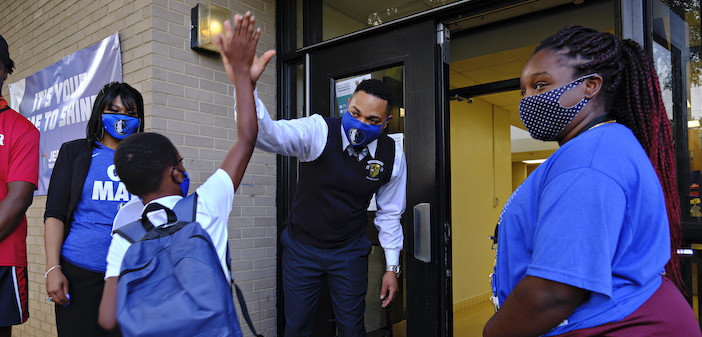With a focus on supporting the schools and students who need it the most, Dallas ISD leaders updated trustees during the Aug. 12 board briefing on how the district is addressing unfinished learning caused by the pandemic.
As expected, STAAR data shows the pandemic negatively impacted student learning both across the state and in Dallas ISD. Deputy Superintendent Susana Cordova said the district is embracing multiple strategies to help catch students up.
Tutoring
More than 55,000 Dallas ISD students could receive 30 hours of tutoring this school year. House Bill 4545, which the Texas legislature passed this year, requires schools to provide 30 hours of tutoring for every failed STAAR test subject.
The district is looking to match up to 32 awarded tutoring providers with schools, while also hiring in-district tutors to support students. From high school students who can make $12.50 an hour tutoring other students to retired teachers who can make $22.50 tutoring, the district invites potential tutors to view this job listing and apply.
Theory of Action
Dallas ISD launched the Theory of Action to support the board’s goal of dramatically improving student achievement and outcomes for all students and realizing its vision of becoming the premier urban school district. In addition to granting certain autonomies to top performing schools, Theory of Action is focusing on racial equity and supporting the campuses with the most needs.
Schools identified as High-Priority Campuses, schools rated Developing or Focus in the current Local Accountability System, or schools determined by other equity factors will have access to more than 40 additional supports.
These supports include priority job fairs and IT service, resident teacher placements, and afterschool programming (will link to the full list of supports).
“We are excited to provide these additional supports and do everything we can to help our schools succeed,” Chief of Strategic Initiatives Brian Lusk said.
Summer learning a success
More than 7,000 Pre-K–8th grade Dallas ISD summer campers experienced fun, hands-on learning and extracurricular activities during the Summer Breeze camp.
In addition to academics, Summer Breeze focused on helping build students’ social and emotional skills to get them ready for the upcoming school year.
Meanwhile, 1,700 of the rising ninth-grade students attending a P-TECH or Early College High School attended classes daily as part of the Summer Bridge program, and high school students recovered 1,414 credits to date.
Extended school year calendar
Forty-six schools chose an extended school year calendar, providing more time to learn for students to catch up.
The five schools with the Redesign calendar started Aug. 2, and the 41 schools with an Intersession calendar stated Aug. 9 Chief of Academics Shannon Trejo said learning is already underway at these schools.
“It’s been amazing to walk into these classrooms and see high-quality learning already underway,” Chief of Academics Shannon Trejo said. “We are thankful to these school leaders, teachers and families who have embraced an extended year calendar.”
In-person learning and social and emotional skills
In addressing trustees on Thursday, Cordova said the research is clear: having a student learn from a great teacher inside the classroom has the biggest positive impact on student performance. The district is using as much funding as possible to develop and retain great teachers and offer small class sizes to help those who need it the most.
Chief of School Leadership Tiffany Huitt added that social and emotional learning practices are built into every school day.
“We anticipate when our students come back, and we support their social and emotional needs, that will show up in their outcomes,’ she said.
The district is also encouraging as many students as possible to engage in cocurricular and extracurricular activities.

